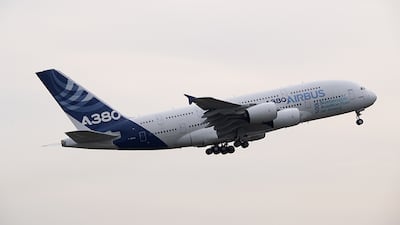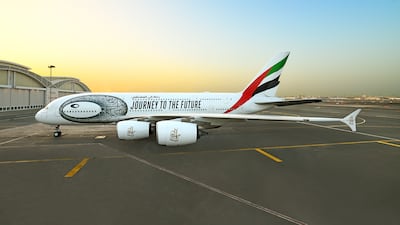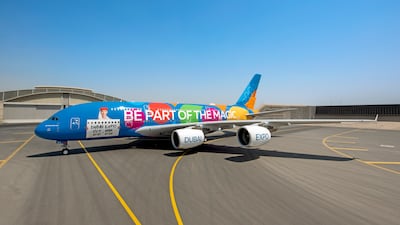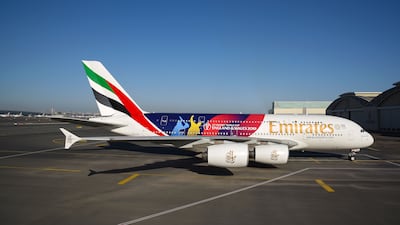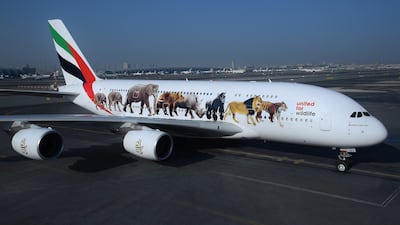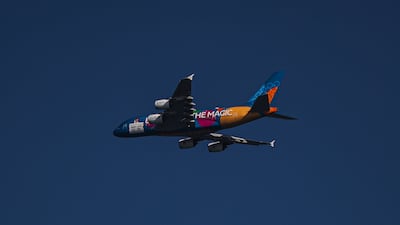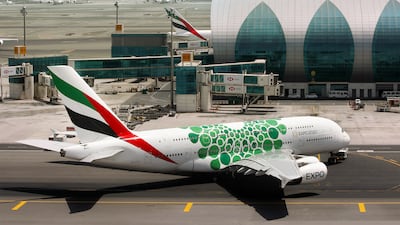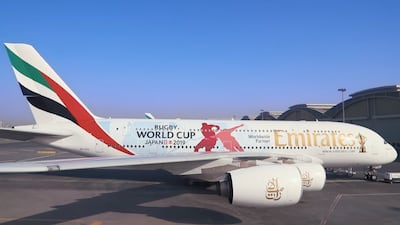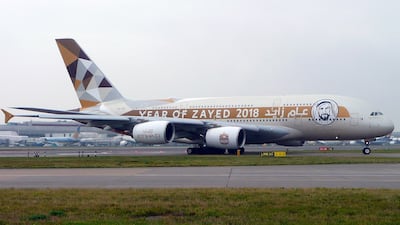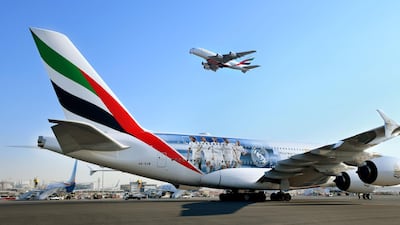Airbus flew the first A380 flight powered by 100 per cent sustainable aviation fuel (SAF) last week, which the industry sees as a way of making flying more environmentally friendly before the introduction of hybrid, electric or hydrogen aircraft.
The four-engined Airbus A380 test aircraft MSN 1 took off from Blagnac Airport in Toulouse, France at 8.43am on March 25, the European planemaker said in a statement. The flight lasted about three hours, operating one Rolls-Royce Trent 900 engine entirely on SAF.
"Increasing the use of SAF remains a key pathway to achieving the industry’s ambition of net-zero carbon emissions by 2050," Airbus said.
Last year, airlines pledged net-zero carbon emissions from their operations by 2050, bringing the air transport industry in line with the objectives of the Paris Agreement to limit global warming to 1.5°C above pre-industrial levels. Airlines are facing pressure from environmental groups to lower their carbon footprint and to build back greener operations after the Covid-19 pandemic.
In October 2021, at the 77th Annual General Meeting of the International Air Transport Association in Boston, US, the industry lobby group outlined plans for achieving this target through a combination of eliminating emissions at the source (such as the use of SAF and improvements to air traffic navigation), offsetting and carbon capture technologies.
Under this plan, Iata estimates that SAF could contribute about 65 per cent of the reduction in emissions needed by aviation to reach net zero in 2050. But this requires a huge increase in production to meet demand. Iata expects the largest acceleration of SAF production in the 2030s as policy support becomes global, SAF becomes competitive with fossil kerosene, and credible offsets become fewer.
The 27 tonnes of unblended SAF for the Airbus A380 flight were provided by TotalEnergies.
The SAF – produced in Normandy, close to Le Havre, France – was made from hydroprocessed esters and fatty acids (Hefa), free of aromatics and sulphur, and primarily consisting of used cooking oil as well as other waste fats.
A second flight, with the same aircraft, was scheduled to operate from Toulouse to Nice Airport, on March 29 to test the use of SAF during take-off and landing.
This is the third Airbus aircraft type to fly on 100 per cent SAF over the past 12 months. The first was an Airbus A350 in March 2021 followed by an A319 Neo single-aisle aircraft in October 2021.
The Waypoint 2050 report, a blueprint for aviation’s sustainable future in line with the Paris Agreement, has identified SAF as a key driver of emissions reduction, because whereas electric and hydrogen-powered flight is the ultimate goal, the technology is unlikely to be introduced for commercial-sized aircraft before the middle of the 2030s.
Currently, less than 0.1 per cent of aviation fuel comes from SAF. To get to critical mass, experts say production would need to be about 2 per cent by 2025 and then rapidly climb.
All Airbus aircraft are presently certified to fly with up to a 50 per cent blend of SAF mixed with kerosene. The aim is to achieve certification of 100 per cent SAF by the end of this decade, the company said.

The A380 aircraft used during the SAF-powered test is the same aircraft recently revealed as Airbus’s ZEROe Demonstrator – a flying test-bed for future technologies needed to bringing the world’s first zero-emission aircraft to market by 2035.
Emirates airline is the world's biggest operator of the A380 with 118 superjumbos in its fleet. Of these, 67 have resumed service after most of the fleet was grounded in 2020 by the Covid-19 pandemic.
"In the time we’ve had them, prior to the pandemic, they’ve produced about 80 per cent of our profits," Emirates airline president Tim Clark told the World Government Summit in Dubai this week when asked about the economics and sustainability of flying the four-engined jet.
"They’re going to be more unique going forward. The consumer demand for these aeroplanes is astronomical, we’re going to refurbish them, refresh them, put more innovation into them, they’re going to be something really special over the next 10 to 15 years," he said. "Watch this space."
Iata is calling on governments and oil majors to redirect their focus and investment to support sustainable aviation fuels to help airlines reach their environmental goals.
Jet fuel produced from biomass or synthetically from renewable power has the potential to slash carbon emissions, although at a higher cost compared with the price of kerosene.
